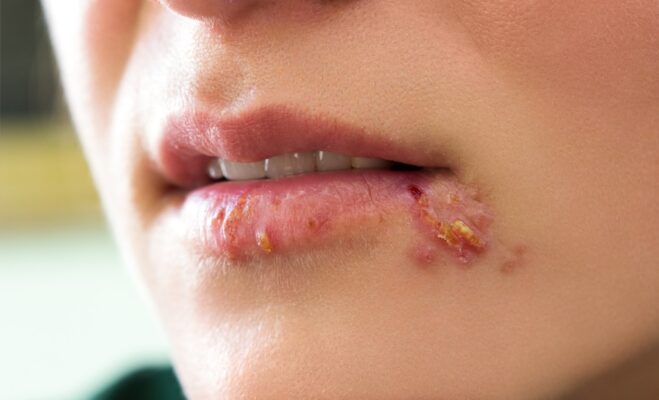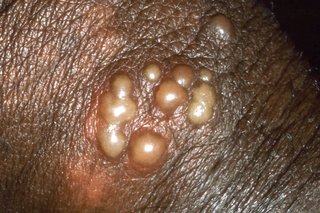Herpes Simplex Virus
Herpes simplex virus is a common virus that affects both men and women. There are two types of herpes simplex virus: HSV-1 and HSV-2. HSV-1 is the type of herpes that causes cold sores, while HSV-2 is the type that causes genital herpes. Herpes simplex virus is transmitted through direct contact with the skin or mucous membranes of someone who is infected. This can happen through sexual contact, kissing, or sharing utensils. Symptoms of herpes simplex virus vary depending on the type of herpes.
Herpes simplex virus: HSV-1
HSV-1, or oral herpes. The most common symptom of HSV-1 is a cold sore, which is a small, red blister that usually appears on or around the lips. Cold sores can be very painful and may break open and crust over. Most people with HSV-1 have only one or two cold sores in their lifetime, but some people have frequent outbreaks. Other symptoms of HSV-1 may include fever, headache, and swollen lymph nodes. There is no cure for HSV-1, but the symptoms can be treated with antiviral medications.

Herpes simplex virus: HSV-2 (genital herpes)
HSV-2, or genital herpes. The most common symptom of HSV-2 is a genital sore, which is a blister or group of blisters on or around the genitals. These sores may be painful and can also break open and crust over. Some people with HSV-2 have no symptoms at all. Others may have frequent outbreaks, or the virus may remain dormant for years. HSV-2 can be transmitted even when there are no symptoms.
Other symptoms of HSV-2 may include flu-like symptoms, such as fever, body aches, and swollen lymph nodes.

If left untreated, HSV-2 can cause serious complications, including meningitis, encephalitis (inflammation of the brain), and aseptic meningitis (inflammation of the fluid around the brain and spinal cord). In rare cases, HSV-2 can even cause blindness. But the good news is that with proper treatment, most people with HSV-2 can lead a normal life.
How is herpes simplex virus diagnosed?
If you think you may have herpes simplex virus, the first step is to see a doctor. Your doctor will take a medical history and perform a physical examination. They may also order a blood test or a test of the fluid from a sore. If the test is positive, your doctor will discuss treatment options with you. There are several antiviral medications that can be used to treat herpes simplex virus.
Important note
One important thing to know about herpes simplex virus is that it can be spread even when there are no symptoms. This is called asymptomatic shedding. During asymptomatic shedding, the virus is present in the body, but there are no visible symptoms. This is why it’s important to practice safe sex, even if you or your partner has no symptoms. Using condoms and other barrier methods can help to reduce the risk of spreading the virus.
preventive measures for herpes simplex virus
There are a few preventive measures that can help to reduce the risk of herpes simplex virus:
- Avoid contact with the sores of someone who has herpes simplex virus. If you do come into contact with the sores, wash the area thoroughly with soap and water.
- If you are sexually active, use condoms and other barrier methods to reduce the risk of spreading the virus.
- Avoid sharing items like razors, lip balm, and toothbrushes.
- Stay healthy by eating a balanced diet, getting enough sleep, and managing stress.
Myths about herpes simplex virus
Myth 1: Only people who have a lot of sexual partners can get herpes simplex virus
One common myth is that only people who have a lot of sexual partners can get herpes simplex virus. The truth is that anyone can get the virus, regardless of their sexual history.
Myth 2: Herpes simplex virus can be spread through casual contact
Another myth is that herpes simplex virus can be spread through casual contact, like shaking hands or sharing a meal. This is not true – herpes simplex virus is only spread through direct contact with the sores or body fluids of someone who is infected.
Myth 3: Herpes simplex virus can be cured
Another common myth about herpes simplex virus is that it can be cured. The truth is that there is no cure for herpes simplex virus, but there are treatments that can help to manage the symptoms. Many people with herpes simplex virus lead healthy, productive lives. They can have romantic relationships, have children, and live a full life. It’s important to remember that the virus does not define who you are.
Myth 4: Only people with low immunity get it
This is a very common myth, but it’s not true. While people with a weakened immune system may be more likely to get herpes simplex virus, it’s not the only factor that determines whether or not someone gets the virus. Age, lifestyle choices, and many other factors can also play a role. The bottom line is that anyone can get herpes simplex virus, regardless of their immune system.
Myth 5: Only women can get herpes simplex virus
That’s a common myth, but it’s just not true. While it’s true that more women than men have herpes simplex virus, it’s not exclusive to any gender. In fact, anyone can get the virus – men, women, and people who don’t identify as either. One reason for this myth is that genital herpes is often associated with the female genitalia. But anyone can get genital herpes, and it’s important to remember that the virus can also cause oral herpes.
Can herpes simplex virus be transmitted through breastfeeding?
The short answer is no, herpes simplex virus cannot be transmitted through breastfeeding. However, it’s important to note that the virus can be transmitted through other means, such as direct contact with the sores. Breastfeeding is actually an important way to protect babies from many diseases, including herpes simplex virus. There are some very rare cases where the virus has been transmitted through breast milk, but this is extremely rare and the risk is very low.
If you’re pregnant or breastfeeding and have herpes simplex virus, it’s important to talk to your doctor about your concerns. There are some precautions you can take to help protect your baby, such as avoiding breastfeeding when you have active sores. And if you are taking medication for herpes simplex virus, it’s important to talk to your doctor about whether it’s safe to continue taking the medication while you’re pregnant or breastfeeding.
Treatment methods for herpes simplex virus
There are several treatment options for herpes simplex virus:
Antiviral medication: to help to reduce the severity and frequency of outbreaks. See your doctor for a proper prescription.
Pain medication: to help to relieve the pain and discomfort associated with outbreaks.
Home remedies such as warm baths and ice packs.
Lifestyle changes that can help to reduce the risk of outbreaks, such as avoiding stress, fatigue, getting enough rest, and certain foods. You can also try to boost your immune system through diet and exercise.
Do herbal remedies work for herpes simplex virus?
Certain herbs, such as echinacea and goldenseal, can boost the immune system and help to fight off the virus. You should make sure to get your herbs from a reputable source.
It’s important to keep in mind that if you do decide to try herbal remedies, you should talk to your doctor first. Some herbs can interact with medications or cause side effects, so it’s important to get your doctor’s approval.
Your Wellness Is Our Concern At Fekomi Wellness
Our team of highly qualified and certified healthcare consultants at Fekomi wellness are always ready and happy to help you with your health concerns. Visit Fekomi wellness today to book an appointment and get started on your health journey. Kindly call our desk line on +2349074197154 for more enquiries.
